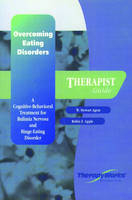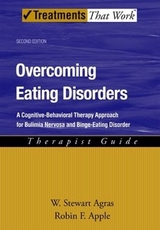
Overcoming Eating Disorders: A Cognitive-Behavioral Treatment for Bulimia Nervosa and Bing-Eating Disorder
Oxford University Press Inc (Verlag)
978-0-19-518676-5 (ISBN)
- Titel erscheint in neuer Auflage
- Artikel merken
Patients are guided to objectively observe their own eating patterns, including contexts in which problematic eating takes place. Through careful education, patients are guided toward normalizing their eating patterns as a way of breaking the deprivation/ binge cycle. Alternative pleasurable activities to problematic eating are explored. Patients are encouraged to explore problematic thoughts associated with bingeing and purging and taught to challenge these thoughts. This "Therapist Guide" contains background information essential to the understanding of Bulimia Nervosa, binge-eating disorder, and its treatment with cognitive-behavioral therapy. It presents a treatment program, including the details of specific therapy sessions and phases of therapy that is based on research that has demonstrated effectiveness. Frequent review of this "Therapist Guide" is recommended in order to maximize consistency and effectiveness. This program is not recommended for treating clients with current diagnoses of Anorexia Nervosa.
W. Stewart Agras received his medical degree from University College, London University, UK, and has published over 300 articles and chapters. He is currently Professor of Psychiatry at the Stanford University School of Medicine, and Director of the Psychiatry Outpatient Clinics. In addition, he is the Director of the Behavioral Medicine Program at Stanford. He is a Past President of the Association for the Advancement of Behavior Therapy (AABT) and of the Society for Behavioral Medicine, and he has been a Fellow at the Center for Advanced Study in the Behavioral Sciences on two occasions. His research has focused primarily on eating disorders, including epidemiologic, laboratory, and clinical outcome studies, with the aim of advancing knowledge and treatment of the eating disorders. Robin F. Apple completed her PhD at the University of California, Los Angeles, and her postdoctoral fellowship at the Oregon Health Sciences University. Since 1993, she has been on staff in the Behavioral Medicine Clinic, Department of Psychiatry, Stanford University Medical Center. Dr. Apple has participated in a multi-center study investigating the effectiveness of interpersonal and cognitive-behavioral therapies for the treatment of Bulimia Nervosa. She has also taken part in numerous other clinical experiences, as well as teaching and writing projects, which focus on the treatment of bulimia and binge-eating disorder and the match between patient and therapy model
SECTION 1: INTRODUCTION TO THE THERAPIST GUIDE AND BACKGROUND INFORMATION CONCERNING COGNITIVE-BEHAVIOURAL THERAPY; 1. Introduction; 2. The Nature of Bulimia Nervosa and Binge-Eating Disorder; 3. The Development of Cognitive-Behavioural Therapy for Bulimia Nervosa; 4. Cognitive-Behavioural Therapy: Some Practical Considerations; 5. Some Special Issues in Treatment; 6. Preliminary Evaluation; SECTION 2: THE FIRST PHASE OF COGNITIVE-BEHAVIOURAL THERAPY; 7. The First Session; 8. The Second Session; 9. The Third Session; 10. The Fourth Session; 11. The Remainder of Phase 1 (Sessions 5-9); 12. Assessing Progress; SECTION 3: THE SECOND PHASE OF COGNITIVE-BEHAVIOURAL THERAPY; 13. Introduction to Phase 2; 14. Feared Foods; 15. Problem Solving; 16. Cognitive Restructuring; 17. Weight and Shape Concerns; 18. Interpersonal Triggers and Transient Negative Mood; SECTION 4: THE THIRD PHASE OF COGNITIVE-BEHAVIOURAL THERAPY; 19. Relapse Prevention
| Reihe/Serie | Treatments That Work |
|---|---|
| Zusatzinfo | numerous figures |
| Verlagsort | New York |
| Sprache | englisch |
| Maße | 151 x 229 mm |
| Gewicht | 225 g |
| Themenwelt | Medizin / Pharmazie ► Medizinische Fachgebiete ► Psychosomatik |
| Medizin / Pharmazie ► Medizinische Fachgebiete ► Psychiatrie / Psychotherapie | |
| ISBN-10 | 0-19-518676-1 / 0195186761 |
| ISBN-13 | 978-0-19-518676-5 / 9780195186765 |
| Zustand | Neuware |
| Haben Sie eine Frage zum Produkt? |
aus dem Bereich



